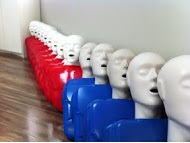Heart disease and how it affects you

Heart disease is the number one killer all over the world. In the US, one in every four deaths is due to heart disease. That amounts to over 600,000 deaths in a year. It is the leading cause of mortality for both men and women, and in 2009, more than half of deaths due to heart disease were men.
Every year, heart attacks happen to over 720,000 Americans. Out of these statistics, 515,000 are first heart attacks while the rest are second or succeeding heart attacks. In the US alone, over $108 billion is spent of cardiac care – from medications to surgery. Surgery is by far the most expensive treatment of heart disease, accounting for thousands of dollars for a single procedure.
Knowledge on heart attack management
When the CDC conducted a survey on how much people knew about cardiac arrest, they found out that although 92% of respondents knew that chest pain was a major sign of heart attack, only 27% knew all the other major signs and symptoms. This accounts for the 47% of cardiac arrest that occur out of a hospital because victims don’t know about early warning signs and when to get medical attention before the heart attack occurs.
Cardiopulmonary resuscitation
CPR is one of the most important management techniques used in addressing cardiac arrest. CPR – particularly chest compression’s and ventilation – help oxygenate the blood and make it circulate to the rest of the body. During cardiac arrest, the victim doesn’t breath normally (or doesn’t breathe at all) and there is no heartbeat. If oxygenated blood cannot reach the tissues and organs of the body, they begin to malfunction and die. This is especially dangerous for the brain, because it can only survive up to ten minutes before the brain tissue begins to die and irreversible damage occurs.
American CPR Courses
Learning CPR will not only help you become prepared to manage a heart attack, it will also help you notice early warning signs and symptoms that a heart attack is about to happen. Our providers in the US have basic and advanced courses, depending on your needs. We have a general public course for people who aren’t in healthcare, and several courses for people who do work in healthcare, or healthcare providers (HCPs).
Basic Courses
Basic Life Support courses cover three simple CPR skills: compression’s, ventilation, and defibrillation outside of a hospital or before medical help arrives. These skills are used to stabilize the victim.
- Heartsaver CPR and AED training
- Basic Life Support for HCPs
- Heartsaver CPR and First Aid Training
Advanced Courses
Advanced Life Support courses on the other hand, are more complex. They teach trainees about medication administration, diagnostics, and equipment – all associated with medical management of cardiac arrest. The techniques are typically done in an organized medical facility, such as a hospital.
- ACLS – Advanced Cardiac Life Support
- PALS – Pediatric Advanced Life Support
Certification
Certificates are valid for two years before they have to be renewed. We require our rescuers to renew before the expiration date, unless they want to take the program again.
